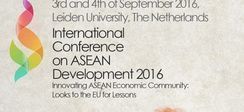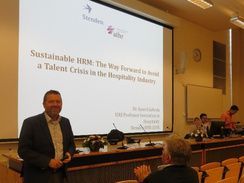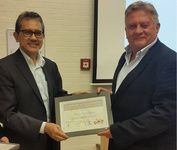
-
 publication: 5 September 2016
publication: 5 September 2016
International Conference on ASEAN Development 2016
by Dr. Sjoerd Gehrels, Academy of International Hospitality Research
The Association of Southeast Asian Nations, or ASEAN, was  established on 8 August 1967 in Bangkok, Thailand, with the signing of the ASEAN Declaration (Bangkok Declaration) by the Founding Fathers of ASEAN, namely Indonesia, Malaysia, Philippines, Singapore and Thailand. Brunei, Vietnam, Laos, Myanmar and Cambodia joined in the years after that making up what is today the ten Member States of ASEAN. Together ASEAN represents a huge market of US$ 2.6 trillion and over 622 million people. Last weekend, September 3rd and 4th, the International Conference on ASEAN Development (ICAD) 2016 was organized by the Student Association of Indonesian Students in The Netherlands (PPI Belanda). PPI is an umbrella organization of youth that was founded in 1926 by Prince Tumenggung Djaksodipoera in Batavia. Our Stenden master students I Made Mahendra Budhiastra (Hospitality & Service Management) and Abyatar Abyatar (Leisure & Tourism Studies) took part in the organization of the ICAD 2016.
established on 8 August 1967 in Bangkok, Thailand, with the signing of the ASEAN Declaration (Bangkok Declaration) by the Founding Fathers of ASEAN, namely Indonesia, Malaysia, Philippines, Singapore and Thailand. Brunei, Vietnam, Laos, Myanmar and Cambodia joined in the years after that making up what is today the ten Member States of ASEAN. Together ASEAN represents a huge market of US$ 2.6 trillion and over 622 million people. Last weekend, September 3rd and 4th, the International Conference on ASEAN Development (ICAD) 2016 was organized by the Student Association of Indonesian Students in The Netherlands (PPI Belanda). PPI is an umbrella organization of youth that was founded in 1926 by Prince Tumenggung Djaksodipoera in Batavia. Our Stenden master students I Made Mahendra Budhiastra (Hospitality & Service Management) and Abyatar Abyatar (Leisure & Tourism Studies) took part in the organization of the ICAD 2016.
The ICAD 2016 took place in the University of Leiden’s Law School and was organized in four ‘chambers’: On Saturday 3rd  September: Politics and Law, and Economics Chambers with speakers, Dr. Armin Cuyvers – Assistant Professor of European Law at the Europa Instituut of Leiden University and Lecturer at Leiden University and Matthjis van den broek – Lecturer at Rotterdam Business School, Member of International Business Advisory Board and Managing Director of Further East Consult. On Sunday 4th September, the Tourism and Culture and Technology Chambers were presented with as invited speakers for Tourism and Culture, Dr. Sjoerd Gehrels and Professor Conrad Lashley of Stenden Hotel Management School, Academy of International Hospitality Research, Leeuwarden. The theme for the International Conference on ASEAN Development was: Innovating ASEAN Economic Community and looking to the European Union for lessons and analyses from the aspects of economics, culture, technology, politics and law.
September: Politics and Law, and Economics Chambers with speakers, Dr. Armin Cuyvers – Assistant Professor of European Law at the Europa Instituut of Leiden University and Lecturer at Leiden University and Matthjis van den broek – Lecturer at Rotterdam Business School, Member of International Business Advisory Board and Managing Director of Further East Consult. On Sunday 4th September, the Tourism and Culture and Technology Chambers were presented with as invited speakers for Tourism and Culture, Dr. Sjoerd Gehrels and Professor Conrad Lashley of Stenden Hotel Management School, Academy of International Hospitality Research, Leeuwarden. The theme for the International Conference on ASEAN Development was: Innovating ASEAN Economic Community and looking to the European Union for lessons and analyses from the aspects of economics, culture, technology, politics and law.
Stenden AIHR input was requested for the Tourism an Culture related question ‘How should ASEAN act in order to solve the  issue of undesirable impact of tourism in the region? Tourism is one of the main economic drivers in most of the ASEAN countries. Tourism also creates undesirable impacts within the region. The cultural authenticity could be damaged easily due to the influx of foreign tourists. ASEAN countries would like to
issue of undesirable impact of tourism in the region? Tourism is one of the main economic drivers in most of the ASEAN countries. Tourism also creates undesirable impacts within the region. The cultural authenticity could be damaged easily due to the influx of foreign tourists. ASEAN countries would like to  look at the European Union to learn both from the positive and the negative aspects. ASEAN countries seem to understand that the EU was never only about economic cooperation. Learning from the EU means going into economic and non-economic aspects of this longer established regional cooperation. Conrad Lashley and Sjoerd Gehrels were also asked to serve as a panel for questioning the presenters of research papers that related to the theme of the conference.
look at the European Union to learn both from the positive and the negative aspects. ASEAN countries seem to understand that the EU was never only about economic cooperation. Learning from the EU means going into economic and non-economic aspects of this longer established regional cooperation. Conrad Lashley and Sjoerd Gehrels were also asked to serve as a panel for questioning the presenters of research papers that related to the theme of the conference.
Especially interesting was the paper of Patrice Pendell, Nagoya  Gakuin University, Nagoya, Japan and Imanuella R. Andilolo, University of Mataram, Lombok, Indonesia about The Road Not Taken Tours (RNTT) pilot project in Lombok, Indonesia, which offers new opportunities for tourism destinations and a potential model for tourism innovations in ASEAN partner countries. RNTT provides face-to-face exchanges between locals with meagre means and relatively affluent foreign tourists for short visits with simple activities. The pursuit preserves cultural identities locally and creates understandings and friendships globally. These unique excursions provide meaningful experiences transcending economic and cultural differences. This interesting and provoking paper will be published in the upcoming AIHR, Research in Hospitality Management journal 6(2) November 2016.
Gakuin University, Nagoya, Japan and Imanuella R. Andilolo, University of Mataram, Lombok, Indonesia about The Road Not Taken Tours (RNTT) pilot project in Lombok, Indonesia, which offers new opportunities for tourism destinations and a potential model for tourism innovations in ASEAN partner countries. RNTT provides face-to-face exchanges between locals with meagre means and relatively affluent foreign tourists for short visits with simple activities. The pursuit preserves cultural identities locally and creates understandings and friendships globally. These unique excursions provide meaningful experiences transcending economic and cultural differences. This interesting and provoking paper will be published in the upcoming AIHR, Research in Hospitality Management journal 6(2) November 2016.




 Back to overview
Back to overview

